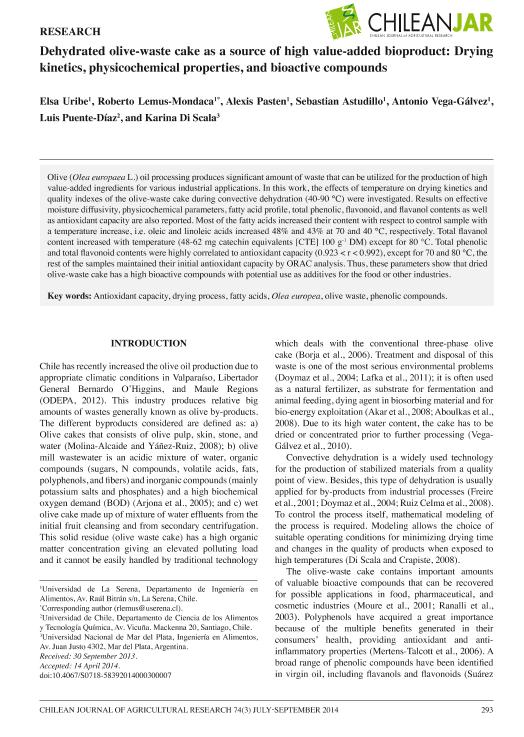Artículo
Dehydrated olive-waste cake as a source of high value-added bioproduct: Drying kinetics, physicochemical properties, and bioactive compounds
Uribe, Elsa; Lemus Mondaca, Roberto; Pasten, Alex; Astudillo, Sebastian; Vega Gálvez, Antonio; Puente Díaz, Luis; Di Scala, Karina Cecilia

Fecha de publicación:
06/2014
Editorial:
Instituto de Investigaciones Agropecuarias
Revista:
Chilean Journal Of Agricultural Research
ISSN:
0718-5820
Idioma:
Inglés
Tipo de recurso:
Artículo publicado
Clasificación temática:
Resumen
Olive (Olea europaea L.) oil processing produces significant amount of waste that can be utilized for the production of high value-added ingredients for various industrial applications. In this work, the effects of temperature on drying kinetics and quality indexes of the olive-waste cake during convective dehydration (40-90 °C) were investigated. Results on effective moisture diffusivity, physicochemical parameters, fatty acid profile, total phenolic, flavonoid, and flavanol contents as well as antioxidant capacity are also reported. Most of the fatty acids increased their content with respect to control sample with a temperature increase, i.e. oleic and linoleic acids increased 48% and 43% at 70 and 40 °C, respectively. Total flavanol content increased with temperature (48-62 mg catechin equivalents [CTE] 100 g-1 DM) except for 80 °C. Total phenolic and total flavonoid contents were highly correlated to antioxidant capacity (0.923 < r < 0.992), except for 70 and 80 °C, the rest of the samples maintained their initial antioxidant capacity by ORAC analysis. Thus, these parameters show that dried olive-waste cake has a high bioactive compounds with potential use as additives for the food or other industries
Archivos asociados
Licencia
Identificadores
Colecciones
Articulos(CCT - MAR DEL PLATA)
Articulos de CTRO.CIENTIFICO TECNOL.CONICET - MAR DEL PLATA
Articulos de CTRO.CIENTIFICO TECNOL.CONICET - MAR DEL PLATA
Citación
Uribe, Elsa; Lemus Mondaca, Roberto; Pasten, Alex; Astudillo, Sebastian; Vega Gálvez, Antonio; et al.; Dehydrated olive-waste cake as a source of high value-added bioproduct: Drying kinetics, physicochemical properties, and bioactive compounds; Instituto de Investigaciones Agropecuarias; Chilean Journal Of Agricultural Research; 74; 3; 6-2014; 293-301
Compartir
Altmétricas



